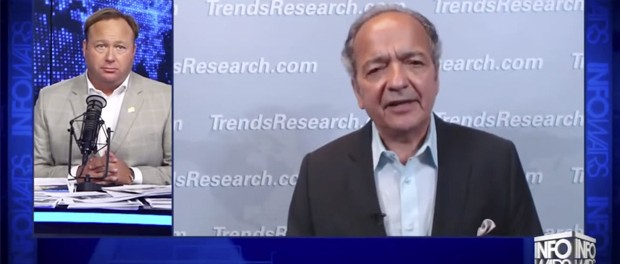Gerald Celente: The Middle East in Flames Defiant Houthi militias in Yemen threaten Saudi oil fields

Article By Infowars.com
Appearing on the Alex Jones Show Wednesday, trends forecaster and the publisher of the Trends Journal, Gerald Celente, explained how the ongoing Saudi attack on the Houthi militia in Yemen will result in revenge attacks on the Gulf Emirates and the oil infrastructure in those countries.
The Houthi militia and Yemeni army units allied with Ansarullah (Shia “Helpers of Allah”) fighters on Thursday fired mortar rounds and missiles into Saudi territory and attacked a Saudi military base, Jabal al-Dood, forcing Saudi soldiers to flee.
Celente notes that as the Saudis continue their relentless and brutal aerial attacks on the Houthi and civilians in one of the poorest countries in the world, the Houthi will expand their operations against the Gulf Emirates in retaliation. These retaliatory attacks will be described by the corporate media as terrorism.
Oil Fields Targeted
According to Jordan officials, the Houthi militia is in possession of Scud missiles capable of hitting Saudi oil fields.
“The security officials described the possession of the missiles by the Iranian-backed Houthi rebels as potentially game-changing and as a direct threat to the Saudi kingdom and its oil fields,” Aaron Klein reported for World Net Daily on May 14.
On June 6, Saudi Arabia claimed it shot down a Scud missile fired from Yemen at the Saudi city of Khamis Mushait where a large air base is located.
Hadi al-Ojaylaki, a senior leader of Yemen’s Ansarullah movement, told Press TV in April the Houthi militia has received advanced Russian missiles capable of targeting Saudi oil installations.
Mohammed Bahiti, a member of the Shia Ansarullah movement, told Al Mayadeen television Houthi militias “will carry out a military attack on Saudi Arabia, if the airstrikes on Yemen don’t come to an end.”
Saudi Attacks Put 26 Million Civilians at Risk
The Saudi attacks in Yemen began in March as part of an effort to reinstall former President Abd Rabbuh Mansour Hadi favored by the Gulf Emirates and the United States.
The United Nations claims more than 2,000 Yemenis have lost their lives as a result of the bombing campaign.
Ivan Simonovic, UN’s deputy secretary-general for human rights, told Al Jazeera in April the vast majority of the victims are civilians.
The International Committee of the Red Cross (ICRC) warned on Wednesday that the worsening humanitarian situation in Yemen will soon put 26 million civilians at risk. The airstrikes have caused severe shortages in food, water, fuel and medical aid, according to Cedric Schweizer, the head of the ICRC delegation in Yemen.
“If the Saudis continue this war – and if they keep killing civilians – this is going to create internal instability in Saudi Arabia itself,” Ali al-Ahmed from the Institute for Gulf Affairs in Washington warned in April.
In addition to a Shia minority harassed by the Wahhabist monarchy in the kingdom’s large Ghawar oil field located in the Eastern Province of the country, a large number of Saudi youths are disaffected.
“An estimated 6,000 have been recruited by al-Qaeda and a further 3,000 have fought for Isil in Syria and Iraq. While the Saudis have 30,000-strong force guarding the oil infrastructure, the risk of infiltration is high even among clans linked to the royal family. Two al-Qaeda suicide bombers in a pipeline attack in 2006 were scions of the ruling elite, one a close relation of a leading Wahhabi cleric and the chief of the religious police,” Ambrose Evans-Pritchard reported for The Telegraph on April 1.